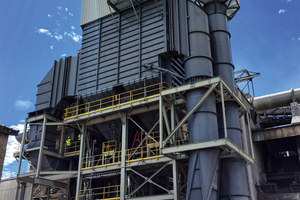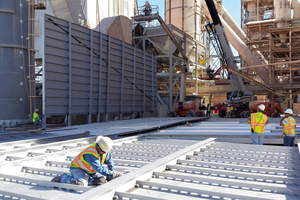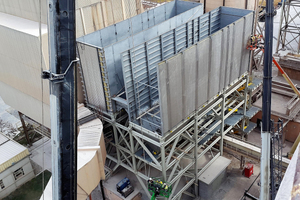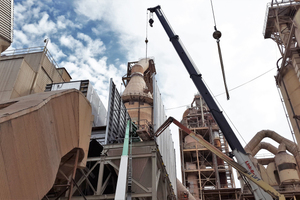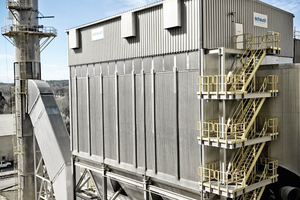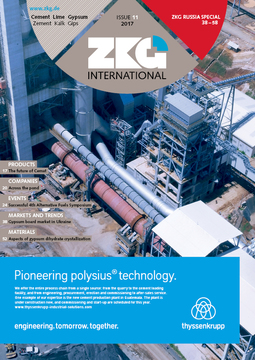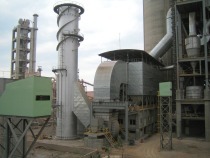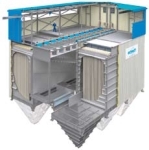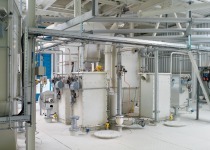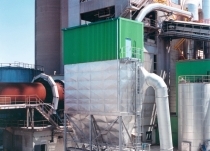Across the pond
A new market, important for the future, and only a few reference projects with which you can prove your expertise on the ground: the pressure to succeed in this situation is huge. Scheuch not only rose to the challenge, it made a great success of it, as several projects go to show.
I think we’ve come out of our baptism of fire really well,” says Andreas Gangl, Scheuch Regional Sales Manager in situ in Atlanta. The client for this important first order in the USA was Cementos Argos, a Columbian group of companies that Scheuch had already worked with on several successful projects in South America. According to Gangl, “this order once again allowed Scheuch to prove how it stands by its customers’ side and supports them in entering new markets effectively”.
Bag filters for Cementos Argos –
and more
Argos was searching for a replacement for its ageing electrostatic precipitators for its cement works located in Newberry, Florida. The old precipitators were not capable of complying with the local NESHAP or CISWI standards that had recently come into force. Scheuch impressed with its bag filters featuring emc technology, which provide a high level of reliability. “The technological advances found in our emc technology were definitely instrumental in us winning the order,” says Project Manager Walter Hochhold, with great conviction. The plant availability achieved with emc filters is > 99%, which is above all due to the fact that small maintenance tasks can be carried out while the plant is operational.
Dealing with local standards and norms was not the only challenge Scheuch had to face, another one was how to install the equipment in the plant: it had been agreed with the customer that the bag filters were to be placed inside the existing electrostatic precipitator housings. Detailed on-site examinations of the housings were carried out to ensure that the four filters – two kiln and two clinker cooler filters – could be optimally integrated into the existing plant. Thanks to the compact dimensions of the new bag filters, there were no problems with the structural design and everything went according to plan. This new technology means that the currently applicable limit values will continue to be met for the foreseeable future. The first filters were put into operation one year after the project started. Scheuch dealt with design and equipment engineering, and supervised the installation work as well. Scheuch also took care of commissioning, although the customer was heavily involved too.
“We scheduled the deliveries to coincide with the Argos production plan, which was a bonus for the customer,” says Walter Hochhold. “The Newberry project was definitely a really important reference project for what we want to do in the USA. We can now build on the foundation of trust we’ve created,” declares Andreas Gangl.
Argos showed just how solid this foundation is by placing another order even before the filters were delivered to the Newberry plant. Practically simultaneously, Scheuch was able to submit a proposal for another of the company group’s plants in Harleyville, South Carolina. This cement works needed to be fitted with new bag filters. Before the contract was concluded, Scheuch invited those responsible for it to come to the main factory in Aurolzmünster, where they could get a picture of how production worked. Alois Hermandinger, Head of the Industrial Minerals Industry division, took them on a tour of the factory hall at the headquarters. They also visited several cement works in Germany and Austria that are equipped with Scheuch filters. And these testimonials really did the trick: it was on the journey back to the USA that the decision was made to go with the pioneer in air pollution control from Innviertel.
One of the factors in this project was how to make best possible use of the available space. Everything had to be accommodated in very compact dimensions on a minimal footprint, while maintaining maximum accessibility. As with the plant in Newberry, a CFD simulation and a flow analysis were performed in advance for Harleyville too. The latter ensures that flow is optimised and pressure loss minimised. In addition to the bag filter, Scheuch also supplied a new fan and a complete dust removal system. This project too covered supervising the installation work and commissioning the plant, again with input from the customer. “Both cement works operators are very happy with the solutions we delivered,” says Andreas Gangl. Two follow-up orders are already on the cards for the Harleyville plant.
Turnkey job for National Cement
Company
The third of the US customers is the National Cement Company (NCC), a member of the French VICAT Group. NCC operates a cement works in Ragland, Alabama. They became aware of Scheuch due to the successful work the company had already done in the USA and invited the Innviertel firm to submit a proposal for a kiln filter. Scheuch really impressed, coming out on top against a dozen competitors. Once again, what was needed was equipment that could meet the stringent new limit values prescribed by law. Unlike with the Argos projects, Scheuch had a turnkey job to deliver for NCC: from design to engineering, installation and commissioning, everything was in safe hands with Scheuch of Upper Austria. Alongside filters, a compressor station, electrical equipment, controls and a dust removal system, Scheuch also delivered a powerful fan with a motor output of around 1200 kW. “At 15 days, the reconnection window including removal and re-installation of the crude and clean gas lines was very tight,” remembers Project Manager Melanie Hosner. “What’s more, there was precious little space available and we had to make sure there would be no collisions with existing equipment when designing the layout.”
This was all the more challenging because there were hardly any plans for the works. Consequently, Scheuch created a 3D scan of the existing plant, allowing it to identify potential problem areas in advance and take account of them in the design. Parts of the fans and filters were supplied pre-assembled. Scheuch’s emc technology was an important factor in winning the order from National Cement too. The customer was looking for a solution that would ensure that the plant would continue to run even if there was a fault with individual bags. The fact that the project was such a triumph was due in no small part to the excellent cooperation received from Jean Claude Brocheton, the Project Manager at National Cement. The entire order was completed in less than a year and the plant was successfully put into operation in February 2017.
//www.scheuch.com" target="_blank" >www.scheuch.com:www.scheuch.com

